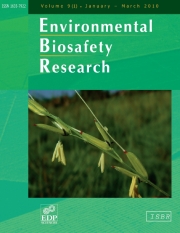Article contents
Assessment of transformability of bacteria associated with tomato and potato plants
Published online by Cambridge University Press: 12 September 2007
Abstract
Transformation of plant-associated bacteria by plant DNA has never been demonstrated in agricultural fields. In total 552 bacterial isolates from stems of Ralstonia solanacearum-infected and healthy tomato plants and from stems and leaves of healthy potato plants were tested for natural genetic competence using plasmid pSKTG DNA and homologous DNA extracts. Control strain Acinetobacterbaylyi ADP1 was transformable with both DNA extracts. No transformable isolates were observed after treatment with plasmid pSKTG DNA. Two isolates, P34, identified as Pseudomonas trivialis and A19, identified as Pseudomonas fragi, were selected on the basis of the consistently higher Rp-resistant CFU numbers after treatment with DNA from Rp-resistant cells than with that from wild-type cells. P34 showed 2.1-fold and A19 1.5-fold higher Rp-resistant CFU numbers after treatment with DNA from homologous Rp-resistant cells versus that from wild-type cells. It is concluded that bacteria capable of in vitro capture and integration of exogenous DNA into their genomes are relatively rare in culturable bacterial communities associated with tomato and potato plants, or that conditions conducive to transformation were not met in transformation assays.
- Type
- Research Article
- Information
- Environmental Biosafety Research , Volume 6 , Issue 1-2: Thematic Issue on Horizontal Gene Transfer , January 2007 , pp. 85 - 89
- Copyright
- © ISBR, EDP Sciences, 2007
References
- 2
- Cited by


